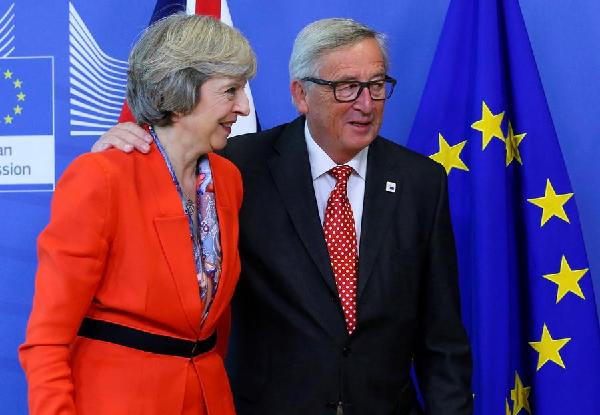May's Brexit plans thrown into chaos by landmark court ruling
Updated: 2016-11-04 08:59
(Xinhua)
|
||||||||
|
|
| British Prime Minister Theresa May (L) is welcomed by European Commission President Jean-Claude Juncker at the EC headquarters in Brussels, Belgium October 21, 2016. [Photo/Agencies] |
LONDON - British Prime Minister Theresa May's plans to bring Britain out of the European Union (EU) were thrown into chaos Thursday.
The High Court in London ruled that parliament, and not May's government, should trigger the Article 50 mechanism to start the Brexit process.
The decision by three of the leading judges in Britain sent shock waves through Westminster, with government officials now studying the full judgement.
Within an hour of the decision, the government confirmed it would appeal by taking the case to the highest court in England, the Supreme Court.
Government lawyers have been given permission to "fast track" an appeal by by-passing the Court of Appeal and going instead to the Supreme Court.
A time slot in early December has already been set aside for an appeal hearing, with all 11 law lords sitting to decide the case.
An official government spokesman expressed disappointment in the High Court's judgment.
"The country voted to leave the European Union in a referendum approved by an Act of Parliament," he said. "And the government is determined to respect the result of the referendum," said the spokesman.
It is not yet known whether May's stated aim to trigger Article 50 by the end of next March can now be met.
A group of individuals who took the case to law to challenge May's Brexit plans were jubilant at the decision, describing it as a victory for parliamentary democracy. They urged the government not to appeal the decision in the Supreme Court.
Lawyer David Greene, one of the individuals who took the case to court, said that although he voted Brexit, his view was that parliament should be the body to trigger Article 50.
In the ruling Thursday, Lord Chief Justice Thomas said: "The government does not have power under the Crown's prerogative to give notice pursuant to Article 50 for the UK to withdraw from the European Union."
Jeremy Corbyn, leader of the main opposition Labour Party said: "This ruling underlines the need for the government to bring its negotiating terms to parliament without delay."
Nigel Farage, the former leader of the anti-EU party UKIP, said after the judgement: "I now fear every attempt will be made to block or delay triggering Article 50.
They have no idea the level of public anger they will provoke. I think we could be at the beginning, with this ruling, of a process where there is a deliberate, wilful attempt by our political class to betray 17.4 million voters."
One legal expert has warned that the decision could mean Brexit would not even happen.
Professor Jon Tonge, professor of politics at the University of Liverpool, said: "The government may well appeal against the decision, but regardless, what it shows is that the battle for Brexit is far from over. Parliament will determine the terms on which we leave the EU. The lack of consensus over what any Brexit deal will look like may mean that ultimately it may never happen."
The issue has centered on who is responsible for implementing the will of the people, the government or parliament?
From the moment she became Prime Minister in July of this year, Theresa May's mantra became Brexit means Brexit and she would lead the people out of the EU.
Political commentators are already speculating whether May will call an early general election to put her authority to the test.
- Summit of Climate Conscience kicks off in Morocco
- British Airways announces special fares for New Year
- S. Korean president says to accept investigation over scandal if necessary
- Names of twin panda cubs born in Austrian zoo revealed
- May's Brexit plans thrown into chaos by landmark court ruling
- Syrian army announces 'humanitarian pause' on Friday

 Ten photos from around China: Oct 28- Nov 3
Ten photos from around China: Oct 28- Nov 3
 Shanghai Art Fair connects people with art in daily life
Shanghai Art Fair connects people with art in daily life
 Chinese captain takes off at Air Show China in Zhuhai
Chinese captain takes off at Air Show China in Zhuhai
 Wuzhen Internet Intl Conference Center under preparation for 3rd WIC
Wuzhen Internet Intl Conference Center under preparation for 3rd WIC
 China's top 10 post-80s self-made billionaires
China's top 10 post-80s self-made billionaires
 Famous paintings recreated with chocolate
Famous paintings recreated with chocolate
 Looking for a ride?
Looking for a ride?
 Robots draw people to China International Industry Fair
Robots draw people to China International Industry Fair
Most Viewed
Editor's Picks

|

|

|

|

|

|
Today's Top News
US election rhetoric unlikely to foreshadow future US-China relations
'Zero Hunger Run' held in Rome
Trump outlines anti-terror plan, proposing extreme vetting for immigrants
Phelps puts spotlight on cupping
US launches airstrikes against IS targets in Libya's Sirte
Ministry slams US-Korean THAAD deployment
Two police officers shot at protest in Dallas
Abe's blame game reveals his policies failing to get results
US Weekly

|

|








